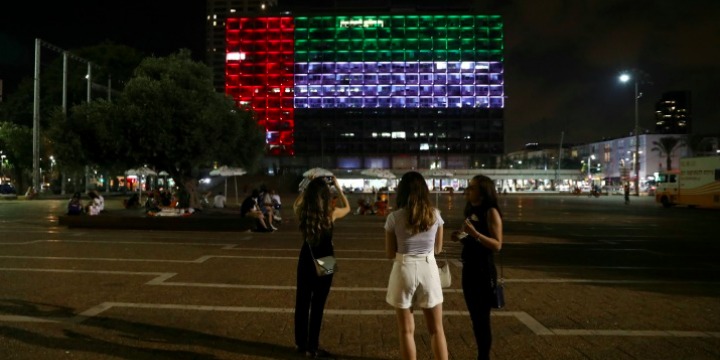In a region that rarely prompts positive headlines, and during a summer overcome by a global pandemic, the announcement that Israel and the United Arab Emirates (UAE) are preparing to normalize their relations is an undeniably historic diplomatic breakthrough.
By seeking to become the third Arab state to formalize ties with Israel, the UAE is finally acknowledging the vast benefits of publicly engaging with the Jewish state, and rekindling hopes of coexistence in a region long darkened by sectarian strife. Making the right choice is often hard, especially when it means shaking up the status quo. Israel, the UAE, and the United States — which deftly brokered the deal — deserve tremendous praise for this bold act that promotes economic growth and security in the Middle East.
The agreement itself followed years of warming ties between Israel and the Gulf Arab states. This has been driven principally by Iran’s aggressive nuclear and expansionist ambitions, as well as by American regional retrenchment. Warming relations have also been driven by an increased appetite for the potential benefits of Israeli technology.
While this outreach has largely remained quiet, particularly on the Arab side, occasional signals — like an official visit in 2018 by Israeli Prime Minister Benjamin Netanyahu to Oman, and by one of his ministers to the UAE’s largest mosque — indicated a seismic shift. Engagement with Israel, long a taboo due to its conflict with the Palestinians, was becoming increasingly public. And, contrary to fearmongering, the sky did not fall.
Questions remain about the substance of the deal. A joint statement issued by the two parties and the US said delegations from Israel and the UAE will soon meet to sign bilateral agreements and are committed to seeking breakthroughs with other nations. Israel also agreed to “suspend declaring sovereignty” over parts of the West Bank — a concession that Abu Dhabi’s Crown Prince Sheikh Mohammed Bin Zayed touted in his own statement. Notably, Netanyahu separately pledged not to remove the issue of sovereignty from the agenda, but rather wait temporarily, at the request of President Donald Trump.
Time will tell how the parties approach this issue, though it seems Jerusalem will not move to extend sovereignty in the immediate term. Much also remains unknown on how normalization will unfold. These are important points the sides will have to hash out, but the willingness of both governments to step forward now suggests a firm commitment to make it work. What is clear, though, is that a formalization of ties will bolster both the UAE and Israel, their shared American ally, and the stability of the Middle East.
As a technology powerhouse, Israel has much to offer to the UAE, which has been working to diversify its economy to reduce reliance on oil, with an eye towards knowledge-based industries. Just this June, following news that three Gulf states reached out to Israel for assistance fighting COVID-19, Israeli and Emirati companies signed an agreement to develop technologies against the pandemic.
The move also indicates greater unity against Iran, a regional aggressor and rival of the UAE, Israel, and the US. Abu Dhabi joined its Gulf allies in cutting ties with Qatar in 2017, partly over its ties with Tehran. The following year, it welcomed the US withdrawal from the nuclear accord with Iran. This month, in a letter to the United Nations Security Council, the six-member Gulf Cooperation Council rebuked Iran’s support of Hezbollah in Lebanon and Syria, Shiite militias in Iraq, Houthi insurgents in Yemen, and “terrorist groups and cells” in Bahrain, Saudi Arabia, and Kuwait.
Unsurprisingly, Iran has denounced the normalization deal as a “dagger in the back” of all Muslims, and an act of “strategic stupidity” that “will undoubtedly strengthen the axis of resistance in the region.” Turkey also condemned the UAE for its “hypocritical behavior,” threatening to suspend diplomatic ties with Abu Dhabi and recall its ambassador. Ironically enough, Turkey continues to maintain diplomatic and trade relations with Israel, although they have become tense in recent years.
The Palestinian Authority likewise slammed the deal, which underscores that Israel’s engagement with the Arab world isn’t wholly contingent on them. While the UAE may claim to have temporarily prevented Israel’s application of sovereignty in the West Bank, the Palestinians will hardly regard this as a victory. Indeed, the Palestinian Authority should have seen the writing on the wall that normalization was long in the works. The Gulf states have become increasingly impatient with the Palestinian leadership’s kneejerk rejectionism and refusal to even try to forge a real path towards progress.
Reactions from Arab nations were more positive. Bahrain hailed the deal for “strengthening stability and peace in the region,” while Oman welcomed it as “historic,” and Egypt, which signed a peace treaty with Israel in 1979, lauded the deal-makers for their efforts “to achieve prosperity and stability for our region.” White House Senior Advisor Jared Kushner has already suggested that there is a “very good chance” that another agreement between Israel and another Arab country could be forthcoming.
Hopefully, this is the first of many similar steps towards normalization between Israel and the Arab world. And while those steps are long overdue, having been hindered by decades of fruitless enmity towards Jewish sovereignty, the UAE-Israel agreement speaks to a brighter future for the Middle East.
Shiri Moshe (@ShiriMoshe) and Ari Cicurel (@AriCicurel) are Senior Policy Analysts at JINSA’s Gemunder Center for Defense and Strategy.
Originally published in Algemeiner

